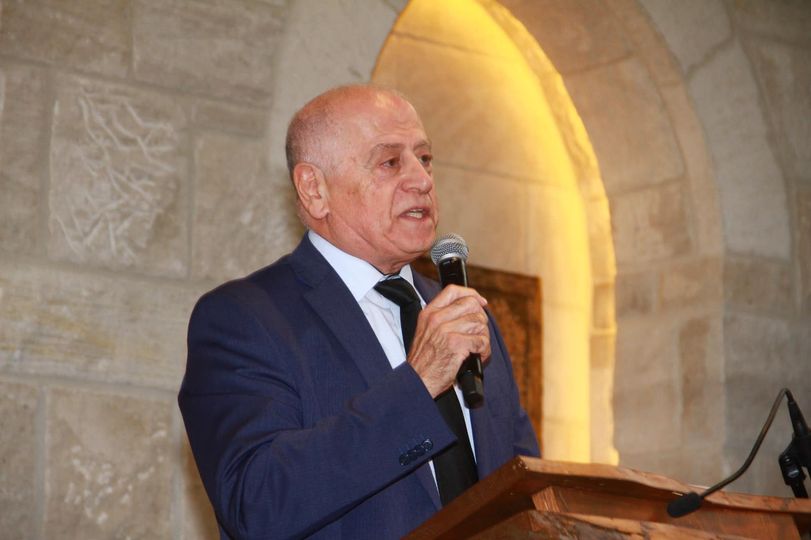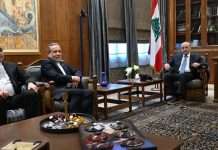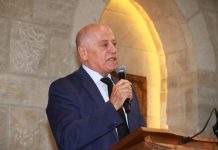Iran and Israel: Three Days After the Recent Events
Colonel Charbel Barakat /June 15/ 2025
ايران واسرائيل بعد ثلاثة أيام على الأحداث الأخيرة
الكولونيل شربل بركات/15 حزيران/2025
بعد ثلاثة أيام على العملية الدقيقة التي قامت بها القوات الاسرائيلية في إيران لمنع الاندفاع نحو عسكرة البرنامج النووي الإيراني الذي يهدد المنطقة بكاملها ونتائجها على صعيد القيادة في طهران، لا يزال الوضع يتدحرج صوب المزيد من التصعيد. فنظام الملالي، الذي يحاول بكل الوسائل حماية نفسه من أي تغيير، لا يهمه ما يتعرّض له مواطنوه من ضغط أو خوف على المصير، كونه مصمم على السيطرة أكثر فأكثر على دول الجوار باستعمال العنف والارهاب. وقد كان بنى دفاعاته من مجموعات ارهابية زرعها في الدول المجاورة لتكون له العون في بسط سيطرته ونشر مبادئه. وبعد أن استتب له الوضع في عدد من البلدان قام بعملية تهديد لازالة اسرائيل من الوجود بواسطة منظمة “حماس” الارهابية كمقدمة لتهديد الغرب من خطر مواجهة مشاريعه التوسعية خارج إيران والدفع نحو انسحاب كافة القوى الحرة من نطاق عمله ليستتب له الأمر ويفرض رؤيته والسيطرة.
اسرائيل التي لم تكن بوارد المواجهة المباشرة، كانت تخاف من برنامجه النووي، لأنه قادر على تحويله إلى وسيلة عسكرية تهدد وجودها، ما لم يخفه رئيس وزرائها السيد نتانياهو منذ سنوات، حيث جاهر بهذا التخوف الذي لم يلق آذانا صاغية في عدد من عواصم القرار الدولية، التي اعتبرته مزايدة غير ضرورية لدرجة أن وقّع الرئيس أوباما على اتفاق مع النظام في طهران في 2015 يسمح له بحرية التصرف بعد عشر سنوات، أي اليوم.
وبالرغم من محاولات الرئيس ترامب الذي كان أوقف العمل بهذا الاتفاق ومحاربته لدرجة منعه عن التجديد بسببه، وصلت الأمور اليوم إلى تمنّع النظام عن الالتزام بضرورات معينة تريح العالم من هاجس الخوف الذي تهيمن عليه امكانية عسكرة البرنامج النووي “السلمي”، وذلك بمنع التخصيب داخل إيران، وهو ما كان بالامكان، في حال القبول به، توفير الضربة الوقائية ومحاولة تجربة اعادة الثقة بهدف إيراني منه.
تهرّب المفاوض الإيراني من الالتزام بالشروط الأميركية دفع باسرائيل، بعد انتهاء مدة الستين يوما التي كان حددها الرئيس ترامب، إلى تنفيذ تهديدها بضرب المنشآت النووية الخاصة بالتخصيب. ولكن منعا لردات الفعل، تطلّب تطلب ذلك توجيه ضربة للقيادة ومجموعة العلماء المشرفين على البرنامج ولوسائل الدفاع الإيرانية المتمثلة بالصواريخ والمضادات الأرضية وما يرتبط بهما. من هنا تضمّنت الضربة الأولى اجتماع قياديي الحرس الثوري حيث قتل عددا منهم ومن ثم بعض العلماء وبعض القواعد العسكرية اضافة إلى مراكز التخصيب النووي.
بالطبع كان الرد الإيراني متوقّع بأسراب من المسيّرات والصواريخ البعيدة المدى الموجهة لمدن اسرائيلية على طريقة “يا ربي تيجي بعينو”، لأنها ستجتاز مسافة الفي كيلومتر تقريبا وستواجه صواريخ مضادة لاعتراضها. من هنا غزارة العدد لكي يصل ما يمكن أن يشكل ضررا وتأثيرا على المواطنين في اسرائيل، مع العلم بأن دقة التصويب لن تكون ناجعة ولا الاهداف، ولكنها شكل من رفع العتب والدعاية الفارغة.
الاعلام العربي و”المقاوم” على السواء يفرح بأن صواريخ إيرانية تصل إلى اسرائيل، وهذا بحد ذاته يشبه “مقاومة” حماس للماكينة العسكرية الاسرائيلية، فهي هناك تسببت بمقتل 80 ألف فلسطيني حتى الآن ودمار كامل العمران في قطاع غزة، ولا يزال المتحمسون من العالم العربي يهللون لهذا التنظيم الذي يكاد يتسبب بإبادة ما تبقى من الفلسطينيين. فهل تكون التوجهات في الاعلام العربي لها نفس المهمة، أي توسيع دائرة الدمار في إيران وتكبيد المواطنين هناك خسائر هم بغنى عنها؟
لن نقول لو لم تقم حماس بعملية طوفان الأقصى، ولكن لو قبلت بعد بداية الدمار والقتل بالاتفاق حول اعادة الرهائن والتسليم بالهزيمة، هل كانت أعطت لاسرائيل مجالا للتدمير والاستمرار بالعمليات العسكرية؟ وفي تحليل مشابه، هل سيدفع الملالي لتدمير إيران فوق رؤوس أبنائها وتحويل المدن العامرة إلى ركام؟ أم أنهم سيرتدعون؟ أو ربما سيقوم الشعب الإيراني باقصائهم والاتفاق مع الاسرائيليين بوساطة دولية لاستعادة الاستقرار بالشروط المقبولة؟
نحن نؤمن بأن الشعب في إيران، ومن خلال قراءة تاريخية، يعرف أن يتقبّل الخسارة ويعرف حدود التمسّك بالقرارات المغلوطة. فيوم قام كسرى الثاني أنو شروان بعمليته متحججا بمقتل صديقه الأمبراطور موريس واحتل دمشق والقدس وقتل تسعين ألف من سكانها وسرق خشبة الصليب وعاد باتجاه بيزنطية ليتحدى هرقل قائلا له “أين الاهك”؟ قام ابنه، بالاتفاق مع هرقل، وبعدما نقل الأخير المعركة إلى عقر داره وهزمه في نينوى، وقتل والده ليخلّص الشعب من الاستمرار بالطريق الخاطئ الذي يؤدي إلى الدمار. ونحن نتمنى اليوم، وبالرغم من كل ما يجري، أن يقدم من في إيران على قلب الطاولة على نظام الملالي الغاشم وربما التخلص من خامنئي من يدري؟ فهل سنتوصل إلى وقف للقتال واعتراف بالهزيمة، إي التوقف عن الاحلام بامتلاك القدرات العسكرية النووية؟ أم أن الأيام المقبلة لا تزال تحمل المزيد من القتل والدمار. وكما تصرّف حزب الله، الاداة الإيرانية، بالامتناع عن تسليم سلاحه للدولة وحلّ جهازه العسكري الغير مجدي، معتقدا بأنه ربما سيشارك به في حفلة التصادم الجديدة مع اسرائيل، لن يقبل الملالي بالتسليم وسيستمرون بمبدأ “عليّ وعلى أعدائي يا رب”؟
الأيام القادمة ستكشف المستور والشرق الأوسط الجديد الخالي من أسلحة الدمار وجماعات الارهاب، والمتوجه نحو التعاون البنّاء والسلام الشامل سوف يكون الجواب. ولن نرى بعده أحلام سيطرة ولا توسّع أو هيمنة وسيتمنى العالم أن يكون له “مرقد عنزة” فيه. فإلى اللقاء قريبا وبعد انتهاء العنف…
Iran and Israel: Three Days After the Recent Events
Colonel Charbel Barakat /June 15/ 2025
Three days after the precise operation carried out by Israeli forces inside Iran to prevent the militarization of its nuclear program—which poses a grave threat to the entire region—the situation remains highly volatile. The Mullahs’ regime, intent on preserving its grip on power at any cost, continues to disregard the anxiety and fear that weigh heavily on its own citizens. Determined to expand its influence through violence and terrorism, it has fortified its reach by planting and empowering proxy militias across neighboring countries, thereby enforcing its domination and exporting its ideology.
After entrenching itself in several Arab capitals, the regime escalated its threats to destroy Israel via the terrorist group Hamas—using that threat as a springboard to challenge the West and push for the withdrawal of all free forces from the region. This would allow Tehran to impose its authority unopposed, asserting both its vision and its control.
Israel, which did not seek a direct confrontation, has long feared the transformation of Iran’s nuclear program into a military threat to its very existence. Prime Minister Benjamin Netanyahu has warned of this danger for years, yet many international powers dismissed his concerns as alarmist. Notably, in 2015, President Obama signed an agreement with the Tehran regime that allowed it considerable nuclear leeway, with key restrictions set to expire—ironically—this year.
Though President Trump worked diligently to cancel the agreement and prevent its renewal, Iran has since refused to accept safeguards that would ease global concerns over its so-called “peaceful” nuclear ambitions. A responsible approach—such as agreeing to conduct enrichment outside of Iranian territory—could have built trust and perhaps prevented the need for a preemptive strike.
But Tehran’s negotiators, dodging American conditions even after a 60-day grace period, left Israel no choice but to act. Thus, Israel made good on its threat by striking enrichment facilities. To prevent Iranian retaliation, it also targeted senior leadership, nuclear scientists, missile infrastructure, and air defense systems. The opening salvo struck a gathering of Revolutionary Guard commanders—killing several—alongside nuclear technicians, military bases, and uranium enrichment sites.
As expected, Iran responded with waves of drones followed by long-range ballistic missiles, launched in a desperate and largely inaccurate attempt to hit Israeli cities. These projectiles traveled thousands of kilometers, intercepted by Israeli anti-missile systems. The sheer volume was intended to ensure that at least a few would get through—not with precision, but to score symbolic points and create fear among civilians.
Much of the Arab and pro-“resistance” media celebrated the Iranian barrage, as they have celebrated Hamas’s “resistance” since October 7. Yet in Gaza, this so-called resistance has led to the deaths of over 80,000 Palestinians and the obliteration of all infrastructure. And still, some Arab voices glorify an organization whose continued defiance may soon result in the complete annihilation of the Palestinian people. Will Iranian media—and their regional allies—repeat this pattern, cheering for more destruction and civilian losses in Iran?
We shouldn’t ask, “What if Hamas hadn’t launched the Al-Aqsa Flood operation?” The better question is: if Hamas, after the devastation began, had agreed to return the hostages and acknowledge defeat, could it have spared Gaza from further destruction? In the same vein, will Iran’s Mullahs drag their people into ruin? Will they reduce Iran’s cities to rubble? Or will they reconsider? Perhaps the Iranian people themselves will act, seeking international mediation, and explore an agreement with Israel to restore stability and prevent further bloodshed.
History tells us that the Iranian people understand how to endure loss and correct misguided paths. Centuries ago, when Khosrow Anushirvan invaded Jerusalem, stole the True Cross, and mocked the Byzantine emperor Heraclius, asking, “Where is your god?”—it was his own son who killed him after the defeat at Nineveh, seeking to save the empire from further ruin.
Today, we hope that a similar awakening will rise within Iran—that its people will overthrow the Mullah regime, save the nation from pointless destruction, and chart a new course toward reconstruction, productivity, and peace in a revitalized Middle East and a world free of terrorism and tyranny.
Will the regime accept a ceasefire and abandon its nuclear ambitions? Or will it plunge deeper into war and devastation? Will the Mullahs, like their Hezbollah proxy in Lebanon, refuse to disband their ineffective and dangerous military apparatus? Will they cling to the ruinous ideology of “me and my enemies, may we all perish together”?
The coming days will reveal what lies ahead. But one thing is clear: the new Middle East—free of weapons of mass destruction and terrorist militias—is already taking shape. A future built on cooperation and comprehensive peace is on the horizon. And when that future arrives, the delusions of expansion, domination, and hegemony will vanish—and even a “goat’s resting place” will be enough for those who once dreamt of empires. Until then, see you after the violence ends.
Colonel Charbel Barakat
***Colonel Charbel Barakat, a retired Lebanese Army officer, historian, terrorism expert, and author of numerous works on Lebanon, the Iranian regime’s schemes, and jihadist movements, has testified multiple times before the U.S. Congress on critical issues, including Iranian and Syrian terrorism, the Syrian occupation of Lebanon, jihadist threats, and the pursuit of Middle East peace.




















